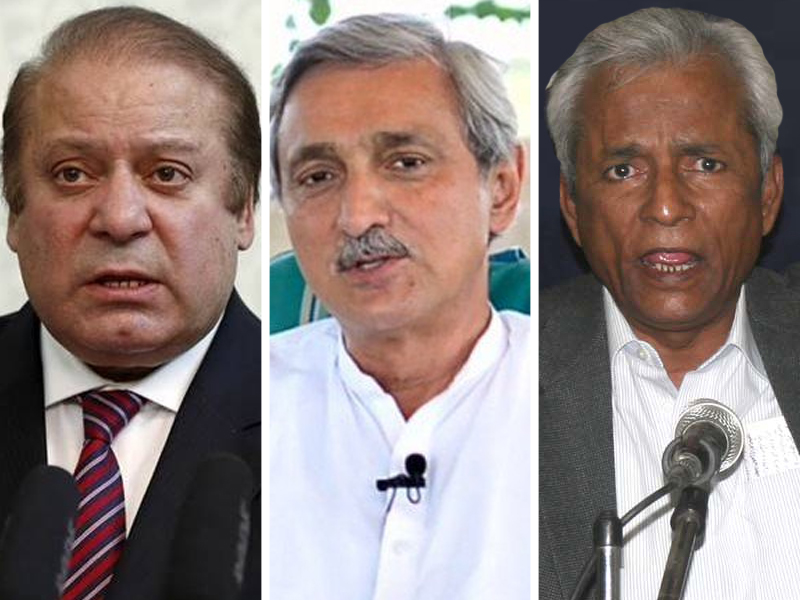
The ousting of sitting prime minister Nawaz Sharif on July 28, 2017, set a precedent which allowed the judiciary the autonomy of barring sitting ministers from holding public office, and in some cases, for lifetime.
Here are the four disqualifications that shook the country in the last year.
Nawaz Sharif - Disqualified as prime minister
Sitting prime minister Nawaz Sharif resigned from his position after the Supreme Court (SC) disqualified him over corruption charges against the Sharif family.
Nehal Hashmi admitted to hospital after chest pain
The apex court ruled that Nawaz is unfit to hold office and ordered a criminal investigation into the Sharif family. The Prime Minister’s office said in a statement that Nawaz has “stepped down” despite having “serious reservations” about the judicial process. The federal cabinet also stands dissolved.
The development came soon after the top court disqualified PM Nawaz from office after a damning corruption probe into his family wealth, cutting short his third stint in power and ordering a criminal investigation of his family. “He [Nawaz] is no more eligible to be an honest member of the parliament, and he ceases to be holding the office of prime minister,” said Judge Ejaz Afzal Khan in court.
Jahangir Tareen - Disqualified from holding public office
In a confusing day of mixed emotions, Pakistan Tehreek-e-Insaf (PTI) saved Chief Imran Khan but could not drag then-secretary general Jahangir Tareen from the ineligibility clause. The SC found Imran to be 'honest' but ruled that Tareen was not.
Neither the PTI nor PML-N welcomed the top court’s judgment. The three-judge bench, headed by Chief Justice of Pakistan (CJP) Mian Saqib Nisar and comprising Justice Umar Ata Bandial and Justice Faisal Arab announced two verdicts on the constitutional petitions filed by Pakistan Muslim League-Nawaz (PML-N) leader Hanif Abbasi seeking the disqualification of Imran and Tareen on various grounds.
Nawaz says SC judgment 'envisaged to disqualify him for lifetime from politics'
The chief justice announced both judgments in courtroom No 1, which was packed with workers of both political parties. The court accepted Imran’s stance on the purchase of Banigala land as well as the establishment of his offshore company.
After the Panama Papers verdict, Naeem Bukhari has emerged victorious. Both judgments have been authored by the chief justice. Interestingly, the verdict has also strongly endorsed the majority verdict in the Panama case.
Nehal Hashmi - Disqualified from holding public office
Nehal Hashmi lost the right to public office for five years after a three-judge bench, headed by Justice Asif Saeed Khosa, announced the disqualification verdict in contempt of court case against Hashmi for delivering hate speech against judges.
Hashmi, along with the jail sentence, has also been ordered to pay a fine of Rs50,000. Hashmi has also been barred from holding public office for the next five years.
Hashmi on May 28, 2017 delivered a fiery speech at a private function and threatened to make miserable lives of the people who ‘have held the Sharif family accountable’. The apex court had taken suo motu notice of his speech while the ruling PML-N had suspended his party membership and asked him to resign from the Senate.
Nawaz Sharif - Permanently disqualified to contest elections
Following the disqualification verdict, questions arose over the length of the disqualification. Analysts contended that the verdict would last years, but the unprecedented verdict dealt another blow to the ruling Pakistan Muslim League-Nawaz (PML-N).
Disqualified for life: Curtain falls on political careers of Sharif, Tareen
The apex court maintained, early April, that if a lawmaker is declared not 'Sadiq' and 'Ameen' – truthful and trustworthy – under Article 62 (1) (f) of the Constitution then he will be permanently disqualified to contest elections.
“We are inclined to hold that the incapacity created for failing to meet the qualifications under Article 62(1)(f) of the Constitution imposes a permanent bar which remains in effect so long as the declaratory judgment supporting the conclusion of one of the delinquent kinds of conduct under Article 62(1)(f) of the Constitution remains in effect,” said the Supreme Court’s much-awaited judgment.
The 52-page verdict was authored by Justice Umar Ata Bandial, who is also in line to eventually become chief justice of Pakistan (CJP) in 2022.



1732259077-0/carti-(1)1732259077-0-165x106.webp)

1732257537-0/Copy-of-Untitled-(64)1732257537-0-270x192.webp)
1726722687-0/Express-Tribune-Web-(9)1726722687-0-270x192.webp)










COMMENTS
Comments are moderated and generally will be posted if they are on-topic and not abusive.
For more information, please see our Comments FAQ